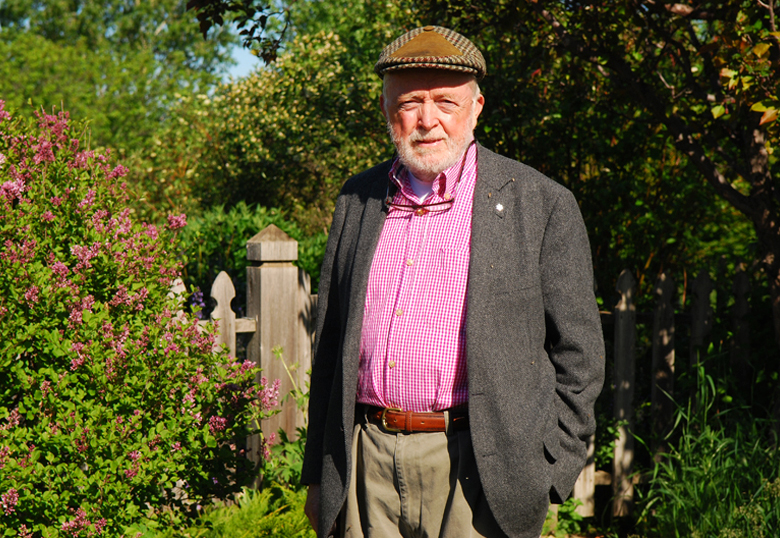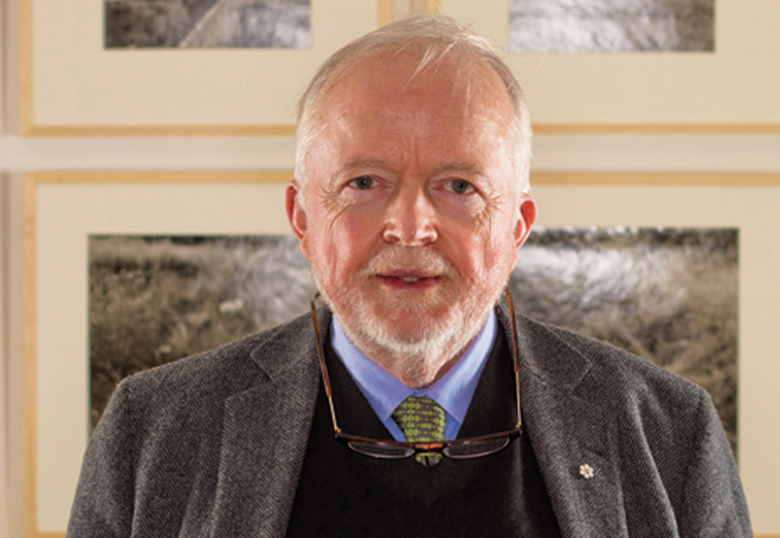Jim Coutts, a southern Alberta-based art collector, political advisor and philanthropist, has formally turned over his homestead property and a significant portion of his art collection to the University of Lethbridge.
On Thursday, June 30, the U of L will formally recognize Coutts for his gift, and launch the Coutts Centre for Western Canadian Heritage, located on the more than 100-year-old property that once belonged to Coutts's grandfather.

The gift, valued at more than $2 million, is comprised of a quarter section of land, the original homestead, extensive gardens and restored outbuildings, as well as more than 200 items from his personal art collection.
Coutts, whose homestead is located just east of Nanton, Alta., is the former secretary and advisor to two Canadian prime ministers (Pearson and Trudeau). He has travelled extensively and acquired art from around the world, with a large portion of his collection showing a clear western Canadian theme.
He purchased the homestead property in 1988 and has since rebuilt it with extensive gardens, restored farm buildings and plots of native grasses and other plants as a tribute to his family and their struggles as pioneers in a harsh prairie environment.

"When you look at the place now with the gardens, grasses and trees and the beauty depicted in the photographs and paintings, that's one thing," says Coutts. "But for many years, for those who came first, it was a very difficult and painful place to live."
Follow this link to a flickr gallery of photos of the Coutts Centre for Western Canadian Heritage. Watch the video below as Coutts describes his connection to the land and his vision for the Coutts Centre.
The property is very much an expression of Coutts himself. The buildings are scattered across the land and include the original homestead; a chicken house, now a guest suite; a barn; and an old ice house and granary, moved from Coutts's mother's neighbouring property, and which are now used as artists' sanctuaries. Additionally, the landscaping and gardens are structured to welcome visitors and encourage exploration.
"Gardens really don't belong to you," Coutts says of his decision to donate the property to the University. "You may as well make it a public place where people can come, freely wander around and experience it. It's your garden, but in fact, nobody really owns their garden. You create a garden, but it is there for everybody."
Coutts was born in nearby High River, but grew up in Nanton. "When you grow up someplace, part of you stays there and part of that place goes with you wherever you are," says Coutts. "Wherever I travelled I always thought of Nanton because it was where I was raised, and I always thought of the land, the prairies, the foothills and so I wanted to have some connection with it and that's why I came back."
"People say you can't go back -- you leave someplace, you really can't go back," says Coutts. "You can visit your parents or you can visit your friends but I've just been blessed because I've been able to come back, I've been able to be a part of the community and be here. I feel I belong here and this is part of me."
The University has asked Coutts to stay involved and to help in the future development of the property.
"The idea is it would be a centre for the visual arts, a centre for horticulture, a centre for prairie restoration and a centre for rural community development," says Coutts. "The development has been a partnership: a partnership with the gardeners, a partnership with the carpenters and the men and women who helped with the restoration, and it's a partnership with my neighbours."
Coutts had been pondering what might happen to the property in the future and, like the many relationships he has developed to create the property, wanted to find a suitable partner to help carry on the work he started.
"The people from the University of Lethbridge were prepared to do exactly what I wanted," says Coutts. "They were prepared to keep it going. It was a continuum of what I started, what I was doing and what I wanted to see in the future."
The property enables the U of L to enhance the student experience in ways relevant to the goals and values described within the framework of a liberal education. "Treating the Coutts Centre as a living classroom, students, faculty and visitors will make use of the natural setting to study the history, artwork, ecosystems and geography associated with the area," says U of L President Mike Mahon.
"We are honoured to be entrusted with this incredible property and more than 200 works of art depicting the beauty of the prairie landscape," says Mahon. "As southern Alberta's university, we recognize the great responsibility we have to all those who call the prairies home."
Some of the artwork donated by Coutts has been displayed through curated exhibitions and publications, and objects from the collection have already been made available to students and faculty during the course of their study.
"We are very grateful to have Jim Coutts as a partner as we establish the Coutts Centre for Western Canadian Heritage, which will preserve and celebrate the diverse culture that is central to the spirit of the west," says Mahon.
"The opportunities this presents for our students, faculty and the southern Alberta community are extensive, and I know many people will look forward to learning in this remarkable location."


